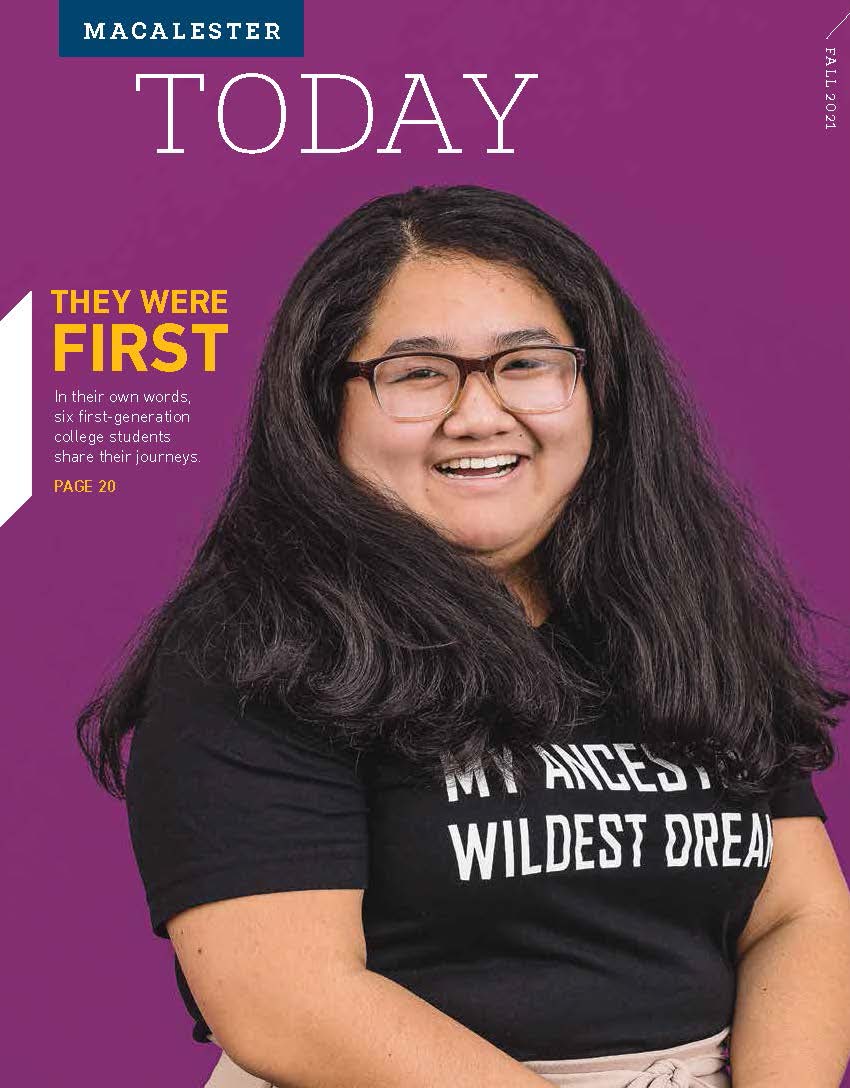
In October, the Macalester community celebrated the inauguration of its seventeenth president, Dr. Suzanne M. Rivera. This column is excerpted and adapted from her inauguration remarks. Watch the full address and view Inauguration photo galleries: macalester.edu/inauguration
Through joyful moments and immense challenges alike, this community has deepened and renewed my appreciation for the power of education as a catalyst to open doors, change trajectories, and question the status quo.
Last year presented incredible difficulties, and yet: students, faculty, and staff continued to stretch themselves and delve into research and class discussions that examined questions and problems that were unfolding in real time.
And, while we’ve discovered new ways in which technology can enhance what we do, we realize with keen appreciation that Zoom meetings never will replace the gift of working and learning together in person, in community.
Togetherness is something I suspect we won’t ever take for granted again.
This year and beyond, we must proceed in a way that is more just and more caring. Many of you know that, before I came to Macalester, I worked as a bioethicist. While there are numerous moral theories that inform bioethics, the one that guides my thinking most is called ethics of care. In their book The Elements of Moral Philosophy, father/son philosophers James Rachels and Stuart Rachels write that ethics of care “begins with a conception of moral life as a network of relationships with specific people, and sees ‘living well’ as caring for those people, attending to their needs, and maintaining their trust.”
I will never forget the care that I’ve seen our community members practice since my arrival on campus on June 1, 2020. It’s with that care—for one another, and for this place—that we move forward together.
And the opportunities are vast.
Now, more than ever, we affirm the transformative power of a Macalester education, equipping our students with the ability to engage in critical analysis, effective communication and persuasion, problem-solving, and teamwork with people who bring to each encounter very different lived experiences. Our alumni bring these skill sets into their jobs, the places where they volunteer, and every other aspect of their lives. Back in 1945, Macalester President Charles Turck wrote that Macalester is “training students to live in the world of tomorrow and not in the world of yesterday.” Seventy-six years later, I couldn’t agree more.
Indeed, while we all know the college song’s opening line, “Dear Old Macalester, ever the same,” what we also know is that Macalester itself is always moving forward. The aspect of Macalester that doesn’t change, that remains “ever the same,” is our willingness—no, our insistence—to be on the cutting edge. What’s “ever the same” about this place, whether you graduated in 1971 or 2021, is our leadership to address the most pressing issues of our time.
A Macalester education also trains our students to collaborate and examine problems across disciplines—and it’s abundantly clear to me that we will not solve any of the challenges we currently face as a nation and globally without interdisciplinary approaches. Perhaps there have been moments in history when a researcher working alone could solve an important problem. But fixing any of today’s most vexing problems—global health challenges, social inequality, climate change, violence and conflict—will require people working together from different perspectives and academic disciplines.
We’ve all seen in the past year how addressing the COVID pandemic has required not only the expertise of virologists, but also of nurses, public policy experts, lab workers, researchers, social workers, clergy, supply-chain engineers, pharmaceutical company executives, activists, and lawyers. And how surviving and understanding the pandemic’s effects has been possible only because of the work of historians, artists, anthropologists, economists, philosophers, and poets. If anyone thought the pandemic might make liberal arts education irrelevant, they were wrong. Far from fading from relevance, the tools developed through a liberal arts education are especially timely in our world today. And Macalester is meeting the moment.
Our efforts to build an even more vibrant and distinctive Macalester begin now. When we engage in this work as a whole community—when we create more equitable pathways in our institution, challenge ourselves to consider other perspectives, and put classroom lessons into action—it makes a difference in small ways and large. The impact of our efforts together will ripple across generations of future Macalester students. It will plant seeds of change on campus, in our neighborhood, across Minnesota, and in communities around the world, in ways we can’t even yet imagine. That amazing possibility is at the heart of what we do on campus, every day.
This vibrant and transformative community inspires me and fills me with hope about our shared future. I can’t wait to see what we accomplish in the years ahead.
Thank you for your partnership as we take this journey onward, together.
Dr. Suzanne M. Rivera is president of Macalester College.
November 17 2021
Back to top





